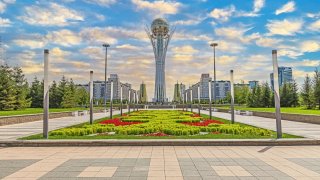Trade Restrictions On Kazakhstan Make No Sense
Donald Trump’s re-election could open new doors for U.S. cooperation in Central Asia.
Realism is back. After four years of the Biden Administration’s lofty idealism, during which time the U.S.-led unipolar world order splintered and chaotic multipolarity ensued, both sides of the Atlantic Ocean are embracing realpolitik. Supply chain delays, bifurcated technology sectors, and restricted access to natural resources have led to the transatlantic partnership re-evaluating its commercial strategy. British foreign secretary David Lammy has since welcomed “progressive realism”—using “realist means to pursue progressive ends”—while U.S. Secretary of State-designate Marco Rubio recently stated, “responsible American foreign policy must be based not on idealistic fantasies but on pragmatic decisions that prioritize the core national interest of the United States above all else.”
As Washington, London, and their closest allies work to decouple from their strategic competitors and secure resilient supply chains, Donald Trump’s re-election could open new doors for U.S. cooperation in Central Asia. This shift has significant implications, particularly for the connectivity, energy, and strategic minerals sectors, where U.S. national interests align with regional opportunities. Former Trump National Security Council official Dr. Eric Rudenshiold writes, “New opportunities for the United States, particularly in expanding the U.S. business sector in Central Asia, may prove irresistible to the new leadership and its businessman boss.”
Consistent, increased American trade with the region, however, will likely remain a non-starter as long as the United States does not provide permanent normalized trade relations (PNTR) to Central Asia’s largest economy, Kazakhstan, and its ample supply of natural resources. Section 402 of the U.S. Trade Act of 1974 prohibits the United States government from normalizing trade relations with emerging market economies that prohibit emigration. As noted by the Congressional Research Service (CRS), “Congress passed this legislation in response to restrictions on emigration from the Soviet Union that disproportionately affected Jews.”
The co-sponsors of what became known as the “Jackson-Vanik Amendment” (including Senator Henry “Scoop” Jackson, the namesake and inspiration of the Henry Jackson Society (HJS)) intended to restrict U.S. commercial ties with any country denying its citizens the right of emigration, imposing excessive taxes on emigration or the exit documents required for such, and/or enacting punitive taxation on citizenry expressing a desire to emigrate.
As HJS has noted, “As a consequence of the legislation, one and a half million Soviet Jews emigrated to the United States and Israel.” Since the collapse of the USSR, former Soviet republics Armenia, Georgia, Kyrgyzstan, Moldova, Russia (until 2022), and Ukraine graduated from the amendments provision into a PNTR arrangement. Kazakhstan, along with Azerbaijan, Tajikistan, and Uzbekistan, while deemed compliant with the Jackson-Vanik statutory mandates, have continued only to receive provisional, annual normalized trade relations status. Legislation introduced during the 118th Congress by Rep. Jimmy Panetta (D-CA) from the House Committee on Ways and Means confirms Kazakhstan allows its citizens to emigrate freely.
The majority of Kazakhstan’s Jews migrated to the United States and Israel following the collapse of the Soviet Union. According to the World Jewish Congress, the Kazakh Jewish community is “stable and organized.” The State Department acknowledges that Kazakhstan’s constitution provides for freedom of religion of belief, and the country’s Chief Rabbi Yeshaya Cohen has stated Jews practice their faith freely without fear of antisemitism. Why then, does the Jackson-Vanik Amendment against Kazakhstan endure? An August CRS report, “Kazakhstan: Backgroun and Issues,” mentioned that “Stakeholders argue that Jackson-Vanik grants the United States leverage on human rights issues.”
However, this is against the letter of the law, which clearly states that Section 402 applies only to emigration restrictions and not to vague, unspecified human rights issues. Progress on democratization and human rights in Kazakhstan is advancing. Laws have been introduced for limiting presidential powers, “strengthening representative governance,” tackling corruption, and toughening domestic violence laws. More work is needed, of course, as Kazakhstan is imperfect, as most emerging democracies are. Kazakh president Kassym-Jomart Tokayev has stated, “All historic change has required political courage” and that Kazakhstan’s reforms are “ushering in a new era of pluralism.” The West should take Kazakhstan at its word.
As the United States looks to secure rare earth supplies crucial for defense and everyday tech manufacturing—and seeks alternative transport routes unburdened by sanctions or leverage from strategic competitors—the stakes are simply too high for Washington to ignore Kazakhstan’s reform efforts. Removing the Jackson-Vanik Amendment, a “bilateral irritant” labeled by Senator Chris Murphy (D-CT), could be a pragmatic acknowledgment by the incoming 119th Congress of the progress Kazakhstan has made and a necessary step to reinforce America’s strategic relationship with Central Asia.
Darren G. Spinck is an associate research fellow with the Henry Jackson Society.
Image: Stephen Langhans / Shutterstock.com.

